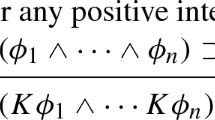Abstract
The idea that knowledge can be extended by inference from what is known seems highly plausible. Yet, as shown by familiar preface paradox and lottery-type cases, the possibility of aggregating uncertainty casts doubt on its tenability. We show that these considerations go much further than previously recognized and significantly restrict the kinds of closure ordinary theories of knowledge can endorse. Meeting the challenge of uncertainty aggregation requires either the restriction of knowledge-extending inferences to single premises, or eliminating epistemic uncertainty in known premises. The first strategy, while effective, retains little of the original idea—conclusions even of modus ponens inferences from known premises are not always known. We then look at the second strategy, inspecting the most elaborate and promising attempt to secure the epistemic role of basic inferences, namely Timothy Williamson’s safety theory of knowledge. We argue that while it indeed has the merit of allowing basic inferences such as modus ponens to extend knowledge, Williamson’s theory faces formidable difficulties. These difficulties, moreover, arise from the very feature responsible for its virtue- the infallibilism of knowledge.
Similar content being viewed by others
References
Alspector-Kelly M. (2011) Why safety doesn’t save closure. Synthese 183(2): 127–142
Cohen S. (1988) How to be a fallibilist. Philosophical Perspectives, 2: 91–123
Christensen D. (2004) Putting logic in its place: Formal constraints on rational belief. OUP, New York
Feldman R. (1981) Fallibilism and knowing that one knows. Philosophical Review 90(2): 266–282
Fumerton R. (2006) Epistemology. Blackwell, Malden, MA
Gettier E. L. (1963) Is justified true belief knowledge?. Analysis 23: 121–123
Hawthorne, J. (2004). Knowledge and lotteries. Oxford: OUP.
Hawthorne, J., & Lasonen-Aarnio, M. (2009). Knowledge and objective chance. In P. Greenough & D. Pritchard (Eds.), Williamson on knowledge (pp. 92–108). Oxford: Oxford University Press.
Hawthorne J., Stanley J. (2008) Knowledge and action. Journal of Philosophy 105(10): 571–590
Kripke, S. (2011). On two paradoxes of knowledge. In Philosophical troubles, collected papers (Vol. I). Oxford: OUP.
Kyburg H. (1961) Probability and the logic of rational belief. Wesleyan University Press, Middletown, CT
Kyburg H. (1970) Conjunctivitis. In: Swain M. (eds) Induction, acceptance and rational belief. Reidel, Dordrecht, pp 55–82
Lewis, D. (1986). A subjectivist’s guide to objective chance. In Philosophical papers (Vol. II, pp. 83–113). Oxford: Oxford University Press.
Lewis, D. (1999). Humean supervenience debugged. (Reprinted from Papers in metaphysics and epistemology, by D. Lewis, Ed., Cambridge: Cambridge University Press).
Makinson D. (1965) The paradox of the preface. Analysis 25: 205–207
Pagin, P. (1990). Review of Roy Sorenson, Blindspots, Clarendon Press, Oxford 1988. History and Philosophy of Logic, 11, 243–245.
Pryor, J. (2000). The skeptic and the dogmatist. Noûs, 34(4), 517–549.
Sharon, A., & Spectre, L. (forthcoming). Evidence and the openness of knowledge. Philosophical Studies.
Smith M. (2010) What else justification could be. Noûs 44(1): 10–31
Stanley J. (2005) Fallibilism and concessive knowledge attributions. Analysis, 65: 126–131
Williamson T. (2000) Knowledge and its limits. OUP, Oxford
Williamson, T. (2009). Reply to John Hawthorne and Maria Lasonen-Aarnio. In P. Greenough & D. Pritchard (Eds.), Williamson on knowledge. Oxford: Oxford University Press.
Author information
Authors and Affiliations
Corresponding author
Rights and permissions
About this article
Cite this article
Sharon, A., Spectre, L. Epistemic closure under deductive inference: what is it and can we afford it?. Synthese 190, 2731–2748 (2013). https://doi.org/10.1007/s11229-012-0078-y
Received:
Accepted:
Published:
Issue Date:
DOI: https://doi.org/10.1007/s11229-012-0078-y




